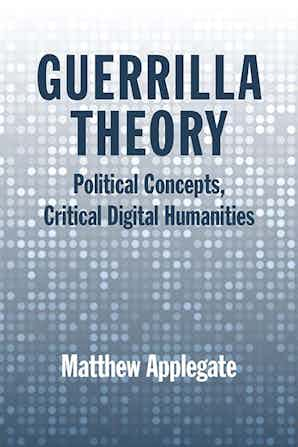Guerilla Theory. Political Concepts, Critical Digital Humanities
 Guerrilla Theory examines the political, ontological, and technological underpinnings of the guerrilla in the digital humanities (DH). The figure of the guerrilla appears in digital humanities’ recent history as an agent of tactical reformation. It refers to a broad swath of disciplinary desires: digital humanities’ claim to collaborative and inclusive pedagogy, minimal and encrypted computing, and a host of minoritarian political interventions in its praxis, including queer politics, critical race studies, and feminist theory.
Guerrilla Theory examines the political, ontological, and technological underpinnings of the guerrilla in the digital humanities (DH). The figure of the guerrilla appears in digital humanities’ recent history as an agent of tactical reformation. It refers to a broad swath of disciplinary desires: digital humanities’ claim to collaborative and inclusive pedagogy, minimal and encrypted computing, and a host of minoritarian political interventions in its praxis, including queer politics, critical race studies, and feminist theory.
In this penetrating study, Matthew Applegate uses the guerrilla to connect popular iterations of digital humanities’ practice to its political rhetoric and infrastructure. By doing so, he reorients DH’s conceptual lexicon around practices of collective becoming, mediated by claims to conflict, antagonism, and democratic will.
Applegate traces Michael Hardt and Antonio Negri’s radical democratic ingresses into network theory, the guerrilla’s role in its discourse, and concerns for the digital humanities’ own invocation of the figure. The book also connects post- and decolonial, feminist, and Marxist iterations of DH praxis to the aesthetic histories of movements such as Latin American Third Cinema and the documentary cinema of the Black Panther Party. Concluding with a meditation on contemporary political modalities inherent in DH’s disciplinary expansion, Guerrilla Theory challenges the current political scope of the digital humanities and thus its future institutional impact.
zum Buch im ULB-Katalog
zum Buch auf der Verlags-Website
Formationen der Praxis: Studien zu Darstellungsformen von Digital Humanities und Literaturwissenschaft
 Mit der Digitaltechnologie haben alternative Objektumgangsweisen Einzug in die literaturwissenschaftliche Alltagspraxis gehalten. Volltextrecherchesysteme, quantitative Textanalyseverfahren, digitale Annotations- und Visualisierungstools tangieren, modifizieren oder substituieren gewöhnliche Arbeitsroutinen. Diese Entwicklungen werden kontrovers – und oftmals im Kontext von meinungsstarken Krisendiagnosen – diskutiert. Vor diesem Hintergrund votiert die Autorin für eine stärkere Empirisierung literaturwissenschaftlicher Selbstbeschreibungen. Hierzu legt sie eine textbasierte Praxeologie der Literaturwissenschaft vor, die mit einer Entdramatisierung der Großerzählungen über die »goldene Zukunft« respektive den »drohenden Untergang« des Fachs durch die Digitaltechnologie verbunden ist.
Mit der Digitaltechnologie haben alternative Objektumgangsweisen Einzug in die literaturwissenschaftliche Alltagspraxis gehalten. Volltextrecherchesysteme, quantitative Textanalyseverfahren, digitale Annotations- und Visualisierungstools tangieren, modifizieren oder substituieren gewöhnliche Arbeitsroutinen. Diese Entwicklungen werden kontrovers – und oftmals im Kontext von meinungsstarken Krisendiagnosen – diskutiert. Vor diesem Hintergrund votiert die Autorin für eine stärkere Empirisierung literaturwissenschaftlicher Selbstbeschreibungen. Hierzu legt sie eine textbasierte Praxeologie der Literaturwissenschaft vor, die mit einer Entdramatisierung der Großerzählungen über die »goldene Zukunft« respektive den »drohenden Untergang« des Fachs durch die Digitaltechnologie verbunden ist.
zum Buch im ULB-Katalog
zum Buch auf der Verlags-Website
Weitere Titel zu den Digital Humanities finden Sie z.B. über eine Suche in disco.
